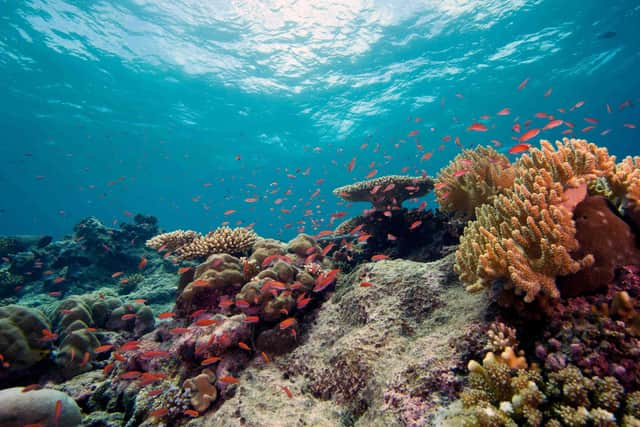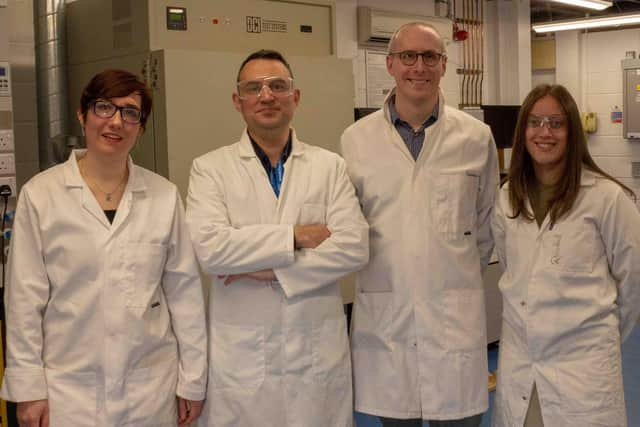Climate change: How Scottish scientists hope to boost the ocean’s ability to safely suck up climate-warming carbon for millennia
Seas and oceans already capture around a quarter of atmospheric carbon dioxide, which is a primary driver of climate change. But the researchers believe a rare mineral could hold the key to unlocking much greater potential for carbon storage in the marine environment.
The work, being conducted by multi-disciplinary teams at Edinburgh’s Heriot-Watt University, has got the go-ahead thanks to funding of more than £1.5 million from the Carbon to Sea Initiative – an international non-profit research and development organisation.
Advertisement
Hide AdAdvertisement
Hide AdCarbon molecules, which are absorbed as part of natural processes, raise acidity when they enter the water, harming habitats and damaging marine life – especially coral reefs and creatures with shells, such as crabs, lobsters and molluscs.
The academics, from Heriot-Watt’s School of Engineering and Physical Sciences, are confident the mineral ikaite, which is rich in calcium and can be made from common limestone, could be harnessed to counteract acidification.
When exposed to seawater, it dissolves and converts carbon dioxide into bicarbonate ions – a chemical compound that neutralises acidity – in a marine process known as ocean alkalinity enhancement (OAE).
If experiments are successful, it could mean a significant increase in the levels of carbon dioxide, which could be safely absorbed by the marine environment for hundreds of thousands of years, according to the team.


Dr Spyros Foteinis, who is based at Heriot-Watt’s Edinburgh campus, said: “In Crystal Ocean we will develop and test the world’s first prototype for the sustainable synthesis of hydrated carbonate minerals, such as ikaite, from ubiquitous and low-cost limestone.
“These minerals have great potential for OAE, but little is known about their exact synthesis conditions and stability.
“For this reason a wide range of experts, spanning from aquatic geochemistry to mathematical modelling to techno-economic and environmental analysis, have been brought together.


“Our main goal is to optimise and commercialise this game-changing technology within the next few years.”
Advertisement
Hide AdAdvertisement
Hide AdCarbon to Sea Initiative is investing a total of £18m in nine projects around the world, including two Heriot-Watt schemes. The Crystal Ocean project, which aims to manufacture ikaite at scale, got £1.05m, while Performance of Ocean Alkalinity Enhancement Technologies was allocated £518,800.
Mike Schroepfer, board chair of Carbon to Sea Initiative, expressed high hopes for the Scottish projects.
“If we’re going to avoid the worst impacts of climate change, we need to aggressively reduce emissions and remove carbon from the atmosphere,” he said.
“Scientists agree that OAE has enormous potential to permanently remove and store carbon and more funding for research is needed. We are here to respond to the call for research funding and answer basic scientific questions about the safety and efficacy of various approaches to OAE.
“If we find that OAE can be applied at scale, we can unlock one of the most efficient, cost-effective approaches to CDR (carbon dioxide removal) for humanity.”
The green light for the projects comes just weeks after a warning from international experts that the planet is likely to reach the 1.5C ‘danger’ limit of temperature rise set out in the Paris climate agreement for at least a year by 2027.
The first week of this month has already seen the mean global temperature breach the 1.5C threshold, and comes following a month of May that was less than 0.1C cooler than the warmest on record.
Associate professor Dr Phil Renforth is involved in both projects.
Advertisement
Hide AdAdvertisement
Hide Ad“Theoretically, our oceans are the largest carbon store on the earth’s surface, capable of holding around 40 times more than the amount of CO2 in our atmosphere,” he said.
“Ocean alkalinity enhancement has enormous potential in terms of CO2 removal, but what’s novel about this project is that we’re creating frameworks for life cycle and techno-economic assessments.
“This will, for the first time, standardise the way we assess the effect of OAE and give us a far greater understanding of its impact.”
Comments
Want to join the conversation? Please or to comment on this article.